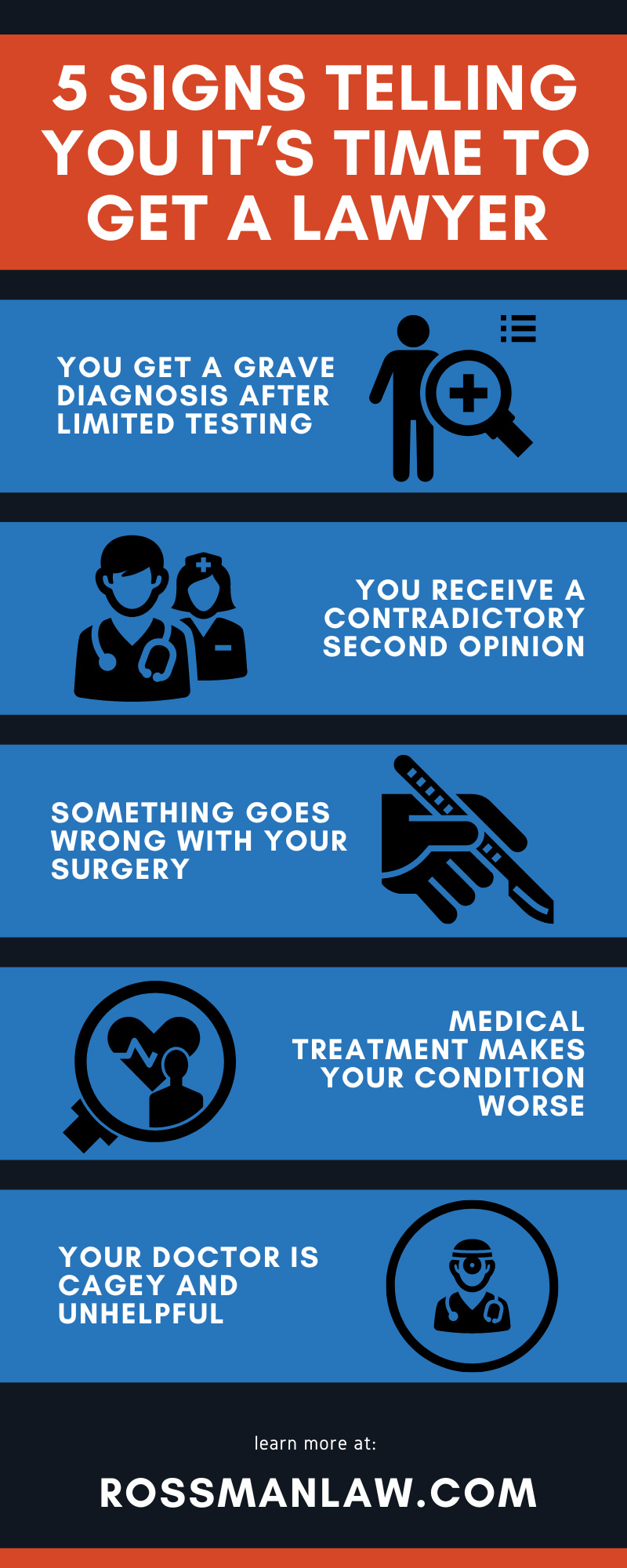
Top 3 Reasons Catastrophic Injury Lawsuits Fail
February 28, 2023
Can You Sue an Airline for Compensation for Injury or Death?
March 15, 2023Whether you get injured or fall ill, when you check into the hospital for treatment, you expect that your providers will give you the best care possible. In most situations, healthcare professionals abide by the industry’s standards of care and do everything in their power to help patients heal.
However, not all providers or treatment plans are equal. If you notice any of the following red flags during your stay in the hospital, they may be signs telling you it’s time to get a lawyer. The talented attorneys at Rossman Law Group have years of experience with medical negligence and malpractice cases; call us for a free consultation if any of these signs sound familiar.
You Get a Grave Diagnosis After Limited Testing
Let’s say you come to your doctor with a health complaint, and they perform a few lab tests. Maybe they take a vial or two of blood and collect a urine sample. Then when the test results come back, your doctor diagnoses you with a serious illness like cancer or organ failure.
While lab tests can indicate the presence of a grave disease, your doctor shouldn’t be diagnosing you based on a small handful of test results. To achieve a reliable diagnosis, doctors must perform detailed physical exams, listen closely to your list of symptoms, and confirm their suspicions with further testing.
Hanging a serious diagnosis on a few basic tests can indicate misdiagnosis, especially if your doctor doesn’t seem interested in getting the complete picture of your condition. Failing to perform a full physical exam could lead them to miss an underlying problem, and your condition could worsen if you receive treatment for the wrong disease. If your doctor seems eager to diagnose you without performing the necessary tests, ask a medical negligence attorney what recourse you have.
You Receive a Contradictory Second Opinion
Seeking out alternate opinions from other physicians is a great way to advocate for yourself if you don’t trust your regular doctor’s diagnosis. When you present the same information about your condition to two or more doctors, you benefit from every bit of expertise they offer you.
What happens if your first doctor tells you your liver is failing, but the second doctor finds nothing wrong with its function? Such vastly differing opinions warrant a closer look because that disparity says that one of those doctors isn’t doing their job correctly.
Talk to an attorney with plenty of experience in medical negligence and malpractice. They can give you reliable advice regarding the next steps with the hospital system.
Something Goes Wrong With Your Surgery
Invasive surgical procedures should be a last resort to treat you because anesthetizing and cutting you open always carries a heightened risk. All of the healthcare professionals involved in surgery follow stringent protocols to maintain a sterile and safe environment in the operating room—or at least they should.
However, surgical error is one of the most common forms of medical malpractice in hospital environments. These errors include, but are not limited to:
- Giving you the wrong blood type for transfusions
- Incorrect administration or dosing of anesthesia
- Operating on the wrong body part
- Using unsterilized surgical instruments
- Nicking or damaging blood vessels or organs during the procedure
- Leaving surgical instruments inside your body before stitching you up
While surgical error is a common form of medical negligence or malpractice, that’s not to say it’s common overall. It’s rare for a surgeon to operate on the wrong body part—but if yours does, call a hospital negligence attorney immediately. Obvious surgical errors constitute compelling evidence for malpractice, and the right attorney can help you win justice for your ordeal and compensation for your bills.
Medical Treatment Makes Your Condition Worse
If you receive treatment for a properly diagnosed medical condition, you should expect your condition to improve. Exceptions include degenerative or terminal diseases—but even with those diagnoses, the proper palliative care can help manage your pain and maintain your quality of life. What options do you have if your treatment plan is making you sicker?
When your condition worsens with medical treatment, your doctor may not be working with the correct diagnosis. If your treatment is causing you pain or illness and your doctor refuses to try other approaches, seek a second medical opinion and consult an attorney. Your healthcare provider should listen to your concerns and do everything they can to help you, respect you, and make decisions with your input.
Your Doctor Is Cagey and Unhelpful
A productive doctor-patient relationship gets built on a foundation of honesty and consistent communication. If you ask your doctor a question about your treatment, they should provide an honest answer that is both thorough and understandable to a layperson. What should you do if you ask a question they refuse to answer?
First, search for another doctor to examine you and provide an alternate opinion. Second, reach out to a malpractice attorney for advice. Doctors should not ignore or dismiss their patients’ complaints, nor should they scoff when a patient mentions doing their own medical research.
While each doctor has their own unique bedside manner, and some may be blunter than others, that bluntness should never cross over into rudeness or indifference. If your doctor refuses to provide helpful, honest answers to your questions, they may be concealing negligent practices.
Your local hospital or doctor’s office should provide adequate treatment and support to improve your medical condition. If the opposite happens during the course of your care, it could be a sign telling you it’s time to get a lawyer.
If any of the red flags we discussed above sound familiar, contact Rossman Law Group at your earliest convenience for a free legal consultation. Our legal team has decades of combined experience with the healthcare system, and getting justice for our clients is our highest priority. Don’t just accept reckless or negligent medical care—fight back against the factors that worsened your condition with a top-tier attorney on your side.






